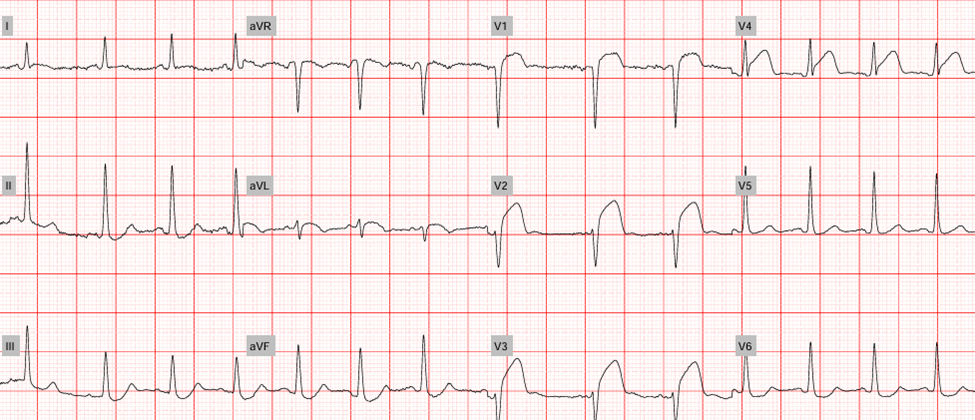A Patient ECG Case: Holidays and STEMI
A 48-year-old male smoker, experiences chest pain Dec. 26 while clearing the driveway just after a snowstorm. He had been smoking, eating, and drinking a fair bit the past couple of days.
He called 911 and the following ECG was obtained by the paramedics:
There is sinus rhythm with marked sinus arrhythmia. ST elevation is seen in V1-V4 and a lessor amount in aVL. ST depression is seen in leads II, III, aVF and V6. This is indicative of an acute anterior infarct.
The patient was taken directly to the heart Cath Lab and an occluded anterior descending was opened and stented.
ST-Elevation Myocardial Infarction (STEMI), during holidays are noted to be more common. This increase in heart attack frequency could be attributed to several factors:
1. Stress: Holidays can be a period of heightened emotional stress. Stress can increase blood pressure and heart rate, leading to greater hydraulic shear at vulnerable atherosclerotic plaques in the heart arteries. This can cause rupture and subsequent coronary thrombosis.
2. Overindulgence: Holidays often involve excessive eating of high-fat meals, smoking, and drinking. This can contribute to a heightened coagulant state of the blood and facilitate coronary thrombosis.
3. Cold Weather: The holiday season may coincide with colder weather, which can constrict arteries and increase blood pressure. Couple this with the vigorous activity of shovelling snow, and STEMIs are certainly possible. However, heart attack cases during the Christmas holidays are observed globally, including in warmer climates. STEMI is a complex phenomenon influenced by lifestyle, and environmental factors, applicable in both warm and cold climates.
4. Neglecting Symptoms: During holidays individuals may ignore symptoms, delaying seeking medical attention.
5. Disruption of Routine: Regular medication schedules and exercise are often disrupted during holidays, which can be detrimental.
A combination of factors can increase the likelihood of STEMI during holiday seasons. It's essential for individuals, especially those with risk factors like smoking or a history of heart disease, to be more vigilant about their health during these times

